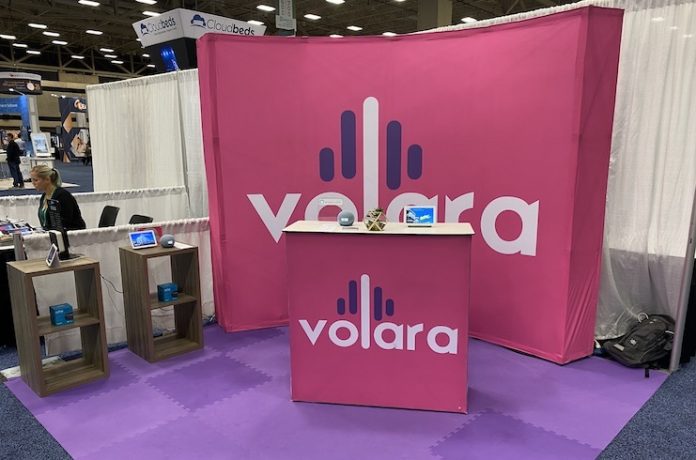At HITEC Dallas 2021 at the Kay Bailey Hutchinson Convention Center, LODGING had a chance to speak to Dave Berger, who is CEO and founder of the voice assistant solution provider Volara. There, he described how Volara is thriving in an environment where guest expectations and hoteliers’ limited staff are increasingly calling for less contact and more autonomy using the voice activated technology they’ve come to know and love in recent years.
What kind of vibe have you been picking up at this HITEC meeting?
Now that domestic leisure travel has picked up again, everyone is expecting international and business travel to follow, and they are clearly here from around the country to get back down to business. I’m seeing a real focus on returning to work and providing amazing hospitality.
Do you agree with what many are saying, that automation is the future of hospitality?
Yes, especially now, while the industry is facing a shortage of staff, automation can help fill the gap. A lot of the tools shown here today, including ours, really drive efficiency, so the staff that is there is able to do more with less and be more productive. At this point in time, too, most people are comfortable with the technology; whether or not they are among the millions who use it in their home or office, nearly everyone now knows what a voice assistant is. When we launched our business in January 2016, there were about 8 million voice assistants in the United States, while today there are hundreds of millions.
Where does Volara fit into the technology mix?
Our vision has been to manage customer relationships through voice automation, something customers have grown increasingly familiar with in the five years since we launched our company in 2016. Our software is built to be platform-agnostic, but all solutions are customized for the individual client. A typical solution would feature promotions, include information about the properties and recommendations from the concierge, and handle request for items and services. Our system currently runs Amazon Alexa, Google Assistant, with more to come.
Around the floor here at HITEC, we’re showcasing our integrations with task management systems, our interactive television solutions, room control providers, and a lot more.
Are there any especially ‘hospitality friendly’ features you would like to mention?
One of the things we actually love to do is set up in advance what we call “secret commands,” which can be implemented for special events at the property. So, if you walk into your guestroom and tell Alexa or the Google Assistant that you’re there for a wedding, you’ll get a greeting from the bride and groom, in their own voice, welcoming you to their wedding. This is one way to make stays memorable, bring the experience to life. We also like to use custom voices more generally, such as having the actual voice of the general manager, concierge, or a celebrity chef offer greetings and information to guests in their rooms.
What are some of the more standard uses of your solutions in hotels?
All of our solutions are on the Google Nest hub, so if a hotel guest says, “Hey, Google, talk to my hotel,” a branded voice for the property can respond to the device. A promotion screen presents what that particular property wants to promote to guests—such as a birthday package, as our LEGOLAND partnership uses. The hotels always provide recommendations about what to do in the area and how to access different features and amenities of the property. They can also have a request feature that integrates ALICE Guest Service, so guests can request items and services.
When working with partners, how do you go about meeting their unique needs?
As a solution provider, that’s the core of what we do. No two hotels are alike, so, although you want to create a brand-consistent voice across all of the properties, there are differentiators among them. Even within a brand like LEGOLAND, there are reasons why you’d want to go to a property in New York versus California versus the United Kingdom—each of which has a unique flavor. We have about 50 different solutions integrated at what we call our “secure voice hub for the hospitality industry”; that’s where we build voice interfaces for our partners and connect them.
Are you aware of any trends in the voice activation space brought on by the pandemic?
It used to be that contactless engagement was a nice thing for hotels to have; now, since the phrase “social distancing” entered the lexicon, it’s nearly a requirement. Most guests now expect to be able to engage with the staff and service amenities of the properties where they’re staying without having to go face to face or even pick up a phone. Using preprogrammed voice activation technology, guests just need to say, “Call the front desk”—or housekeeping or room service—to get a hands-free, live connection to those services.
Where do you see Volora going next?
Our vision is to manage customer relationships through automated voice. We have done a lot of work in hotel guestrooms, senior living communities, airports and stadiums, and retail outlets. We think voice automation can play a role anywhere that the customer is engaging with a member of staff.










